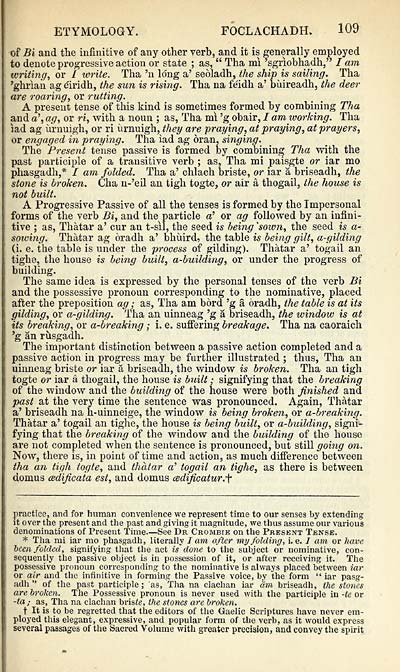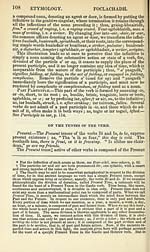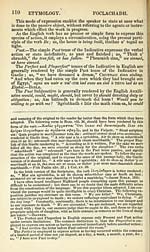Books and other items printed in Gaelic from 1841 to 1870 > Stéidhean a' Ghràmair Ghaëlig
(137) Page 109
Download files
Complete book:
Individual page:
Thumbnail gallery: Grid view | List view

ETYMOLOGY. FOCLACHADH. 109
of Bi and the infinitive of any other verb, and it is generally employed
to denote progressive action or state ; as, " Tha mì 'sgrìobhadh," / am
writing, or / write. Tha 'n ldng a' seòladh, the ship is sailing. Tha
'ghrìaii ag eiridh, the sun is rising. Tha na fe'idh a' bùireadh, the deer
are roaring, or rutting.
A present tense of this kind is sometimes formed by combining Tha
and a\ag, or ri, with a noun ; as, Tha mì 'g obair, Iam working. Tha
ìad ag ùrnuìgh, or ri ùrnuigh, they are praying, at praying, at prayers,
or engaged in praying. Tha ìad ag òran, singing.
The Present tense passive is formed by combining Tha with the
past participle of a transitive verb ; as, Tha mi paisgte or iar mo
phasgadh,* / am folded. Tha a' chlach briste, or iar à briseadh, the
stone is broken. Cha n-'eil an tigh togte, or air à thogail, the house is
not built.
A Progressive Passive of all the tenses is formed by the Impersonal
forms of the verb Bi, and the particle a' or ag followed by an infini-
tive ; as, Thàtar a' cur an t-sìl, the seed is being 'sown, the seed is a-
sowing. Thàtar ag òradh a' bhùird, the table is being gilt, a-gilding
(i. e. the table is under the process of gilding). Thàtar a' togail an
tighe, the house is being built, a-building, or under the progress of
building.
The same idea is expressed by the personal tenses of the verb Bi
and the possessive pronoun corresponding to the nominative, placed
after the preposition ag ; as, Tha am bòrd 'g a òradh, the table is at its
gilding, or a-gilding. Tha an uinneag 'g à briseadh, the window is at
its breaking, or a-breaking ; i. e. suffering breakage. Tha na caoraich
'g àn rùsgadh.
The important distinction between a passive action completed and a
passive actìon in progress may be further illustrated ; thus, Tha an
uinneag briste or iar à briseadh, the window is broken. Tha an tigh
togte or iar à thogail, the house is built ; signifying that the breaking
of the window and the building of the house were both finished and
past at the very time the sentence was pronounced. Again, Thàtar
a' briseaclh na h-uinneige, the window is being broken, or a-breaking.
Thàtar a' togail an tighe, the house is being built, or a-building, signi-
fying that the breaking of the window and the building of tlìe house
are not completed when the sentence is pronounced, but still going on.
Now, there is, in point of time and action, as much difference between
tha an tigh togte, and thàtar a' togail an tighe, as there is between
domus cedificata est, and domus cedificatur.^
practice, and for human convenience we represent time to our senses by extending
it over the present and the past and giving it magnitude, we thus assume our various
denominations of Present Time See Dr Crombie on the Presbnt Tense.
* Tha mi iar mo phasgadh, literally I am after my folding, i. e. I am or liavc
been folded, signifying that the act is"done to the subject or nominative, con-
sequently the passive object is in possession of it, or after receiving it. The
possessive pronoun corresponding to the nominative is always placed between iar
or air and the infinitive in forming the Passive voice, by the form " iar pasg-
adh " of the past participle ; "as, Tha na clachan iar am briseadh, the stones
are broken. The Possessive pronoun is never used with the participle in -te or
-ta,- as, Tha na clachan brisfe, the stones are broken.
t It is to be regretted that the editors of the Gaelic Scriptures have never em-
ployed this elegant, expressive, and popular form of the verb, as it would express
several passages of the Sacred Volume with greater precision, and convey the spirit
of Bi and the infinitive of any other verb, and it is generally employed
to denote progressive action or state ; as, " Tha mì 'sgrìobhadh," / am
writing, or / write. Tha 'n ldng a' seòladh, the ship is sailing. Tha
'ghrìaii ag eiridh, the sun is rising. Tha na fe'idh a' bùireadh, the deer
are roaring, or rutting.
A present tense of this kind is sometimes formed by combining Tha
and a\ag, or ri, with a noun ; as, Tha mì 'g obair, Iam working. Tha
ìad ag ùrnuìgh, or ri ùrnuigh, they are praying, at praying, at prayers,
or engaged in praying. Tha ìad ag òran, singing.
The Present tense passive is formed by combining Tha with the
past participle of a transitive verb ; as, Tha mi paisgte or iar mo
phasgadh,* / am folded. Tha a' chlach briste, or iar à briseadh, the
stone is broken. Cha n-'eil an tigh togte, or air à thogail, the house is
not built.
A Progressive Passive of all the tenses is formed by the Impersonal
forms of the verb Bi, and the particle a' or ag followed by an infini-
tive ; as, Thàtar a' cur an t-sìl, the seed is being 'sown, the seed is a-
sowing. Thàtar ag òradh a' bhùird, the table is being gilt, a-gilding
(i. e. the table is under the process of gilding). Thàtar a' togail an
tighe, the house is being built, a-building, or under the progress of
building.
The same idea is expressed by the personal tenses of the verb Bi
and the possessive pronoun corresponding to the nominative, placed
after the preposition ag ; as, Tha am bòrd 'g a òradh, the table is at its
gilding, or a-gilding. Tha an uinneag 'g à briseadh, the window is at
its breaking, or a-breaking ; i. e. suffering breakage. Tha na caoraich
'g àn rùsgadh.
The important distinction between a passive action completed and a
passive actìon in progress may be further illustrated ; thus, Tha an
uinneag briste or iar à briseadh, the window is broken. Tha an tigh
togte or iar à thogail, the house is built ; signifying that the breaking
of the window and the building of the house were both finished and
past at the very time the sentence was pronounced. Again, Thàtar
a' briseaclh na h-uinneige, the window is being broken, or a-breaking.
Thàtar a' togail an tighe, the house is being built, or a-building, signi-
fying that the breaking of the window and the building of tlìe house
are not completed when the sentence is pronounced, but still going on.
Now, there is, in point of time and action, as much difference between
tha an tigh togte, and thàtar a' togail an tighe, as there is between
domus cedificata est, and domus cedificatur.^
practice, and for human convenience we represent time to our senses by extending
it over the present and the past and giving it magnitude, we thus assume our various
denominations of Present Time See Dr Crombie on the Presbnt Tense.
* Tha mi iar mo phasgadh, literally I am after my folding, i. e. I am or liavc
been folded, signifying that the act is"done to the subject or nominative, con-
sequently the passive object is in possession of it, or after receiving it. The
possessive pronoun corresponding to the nominative is always placed between iar
or air and the infinitive in forming the Passive voice, by the form " iar pasg-
adh " of the past participle ; "as, Tha na clachan iar am briseadh, the stones
are broken. The Possessive pronoun is never used with the participle in -te or
-ta,- as, Tha na clachan brisfe, the stones are broken.
t It is to be regretted that the editors of the Gaelic Scriptures have never em-
ployed this elegant, expressive, and popular form of the verb, as it would express
several passages of the Sacred Volume with greater precision, and convey the spirit
Set display mode to:
![]() Universal Viewer |
Universal Viewer | ![]() Mirador |
Large image | Transcription
Mirador |
Large image | Transcription
Images and transcriptions on this page, including medium image downloads, may be used under the Creative Commons Attribution 4.0 International Licence unless otherwise stated. ![]()
| Rare items in Gaelic > Books and other items printed in Gaelic from 1841 to 1870 > Stéidhean a' Ghràmair Ghaëlig > (137) Page 109 |
|---|
| Permanent URL | https://digital.nls.uk/101713243 |
|---|
| Description | Out-of-copyright books printed in Gaelic between 1631 and 1900. Also some pamphlets and chapbooks. Includes poetry and songs, religious books such as catechisms and hymns, and different editions of the Bible and the Psalms. Also includes the second book ever published in Gaelic in 1631. |
|---|

